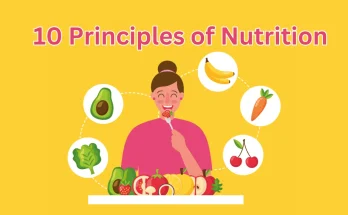Nutrition plays a vital role in our overall health and well-being. Every day, we make choices about the food we consume, but how often do we stop and think about the principles that guide those choices? The term “nutrition concept” may sound technical, but it’s essentially the foundation of how food affects our bodies, provides energy, and promotes optimal health. By understanding nutrition concepts, we can make informed decisions about our diets, leading to better physical and mental health.
This article will explain nutrition concepts, why they matter, and how they impact everything from daily life to long-term health outcomes.
Defining the Concept of Nutrition
At its core, nutrition studies how food impacts the body. The concept of nutrition refers to the science and understanding of nutrients, including how they are consumed, digested, metabolized, and utilized by the body for energy, growth, and repair. This also encompasses how food choices affect health, both positively and negatively.
Key Nutrients: The Building Blocks of Nutrition
The concept of nutrition revolves around six essential nutrients that our bodies require to function properly. Each nutrient plays a unique role in our health and contributes to a balanced diet:
- Carbohydrates: These are the body’s main source of energy. Foods like grains, fruits, vegetables, and legumes provide the necessary fuel for daily activities and brain function. Simple carbohydrates (sugars) offer quick energy, while complex carbohydrates (fiber and starch) provide sustained energy.
- Proteins: Proteins are crucial for tissue repair, immune function, and muscle growth. Found in animal products like meat, fish, eggs, and dairy, as well as plant-based sources like beans, lentils, nuts, and seeds, proteins are the building blocks of life.
- Fats: Often misunderstood, fats are essential for absorbing fat-soluble vitamins (A, D, E, and K), protecting organs, and providing energy. Healthy fats, such as those from avocados, olive oil, and fatty fish, are crucial for heart health and brain function.
- Vitamins: These micronutrients support a range of biological processes, including immune function, bone health, and skin health. Different vitamins are found in various foods; for example, citrus fruits are rich in Vitamin C, while dairy products provide Vitamin D.
- Minerals: Like vitamins, minerals are essential for maintaining various bodily functions. Calcium, for example, strengthens bones, while iron helps carry oxygen in the blood. These nutrients are obtained from a variety of food sources, such as leafy greens, nuts, and whole grains.
- Water: Often overlooked, water is essential for nearly every process in the body, including digestion, temperature regulation, and waste elimination. It makes up about 60% of the human body and must be consumed regularly for optimal health.
Nutrition Concept and Balanced Diets
A central concept of nutrition is the idea of balance. No single food can provide all the nutrients our body needs, which is why it’s essential to eat a variety of foods from all the food groups. A balanced diet ensures we get the right proportions of carbohydrates, proteins, fats, vitamins, and minerals. This concept emphasizes moderation and diversity in our food choices.
For example, the concept of a balanced plate encourages the consumption of:
- Fruits and Vegetables: Half of your plate should be filled with fruits and vegetables, as they are packed with essential vitamins, minerals, and fiber.
- Proteins and Grains: The other half should be divided between lean proteins (such as chicken, tofu, or beans) and whole grains (like brown rice, quinoa, or oats), which provide sustained energy and support muscle repair.
The Importance of Portion Control
Another crucial nutrition concept is portion control, which involves regulating the amount of food we eat. Overeating, even healthy foods, can lead to weight gain and health issues like obesity, diabetes, and heart disease. Learning to control portions helps manage caloric intake while still getting the necessary nutrients.
For instance, using smaller plates, paying attention to hunger cues, and understanding serving sizes are simple but effective ways to practice portion control. It’s not just about what you eat but how much of it you consume.
The Role of Nutrient Timing
The concept of nutrient timing refers to when you eat certain foods to optimize health and performance. This idea is particularly important for athletes or those with specific health goals, such as muscle gain or weight loss. Consuming the right nutrients at the right times can enhance metabolism, energy levels, and recovery.
For example, eating a carbohydrate-rich meal before exercise provides the energy needed for activity, while protein after exercise aids in muscle repair and recovery.
The Concept of Dietary Guidelines
Most governments and health organizations around the world promote specific dietary guidelines, another fundamental nutrition concept. These guidelines offer general advice on what individuals should eat to maintain good health and prevent diseases. The USDA’s MyPlate in the United States, for example, is a visual representation of the ideal balance of fruits, vegetables, grains, protein, and dairy.
These guidelines emphasize:
- Variety: Eating a wide range of foods to ensure that you get all necessary nutrients.
- Moderation: Limiting intake of high-sugar, high-fat, and processed foods.
- Physical Activity: Combining healthy eating with regular physical exercise to maintain a healthy weight.
Nutrition and Disease Prevention
A significant aspect of the nutrition concept is its role in preventing and managing diseases. A poor diet is one of the leading risk factors for chronic conditions such as heart disease, diabetes, and certain cancers. Understanding how different foods affect the body helps in reducing the risk of these illnesses.
For example, diets high in fruits, vegetables, whole grains, and lean proteins are linked to lower risks of cardiovascular disease and cancer. On the other hand, diets high in processed foods, sugar, and unhealthy fats can increase the likelihood of developing chronic conditions.
The Psychology of Nutrition
An often-overlooked part of nutrition is the psychological aspect. Eating habits are deeply tied to emotions, culture, and lifestyle. Understanding the psychology behind nutrition helps in creating a healthy relationship with food, avoiding emotional eating, and addressing disordered eating patterns.
This concept also covers mindful eating, where individuals are encouraged to slow down, enjoy their meals, and listen to their bodies’ hunger and fullness cues. This approach can lead to healthier eating patterns and better weight management.
Conclusion
Nutrition is not just about what we eat but how those choices affect our overall health and well-being. The concept of nutrition encompasses understanding nutrients, making balanced food choices, and applying moderation and variety in our diets. By adopting these nutrition concepts, we can fuel our bodies properly, prevent diseases, and enjoy a healthier, more fulfilling life.
Embracing the principles of good nutrition is a lifelong journey that provides endless benefits. Whether your goal is to lose weight, improve athletic performance, or simply enhance your quality of life, understanding and applying nutrition concepts is the foundation for success.



